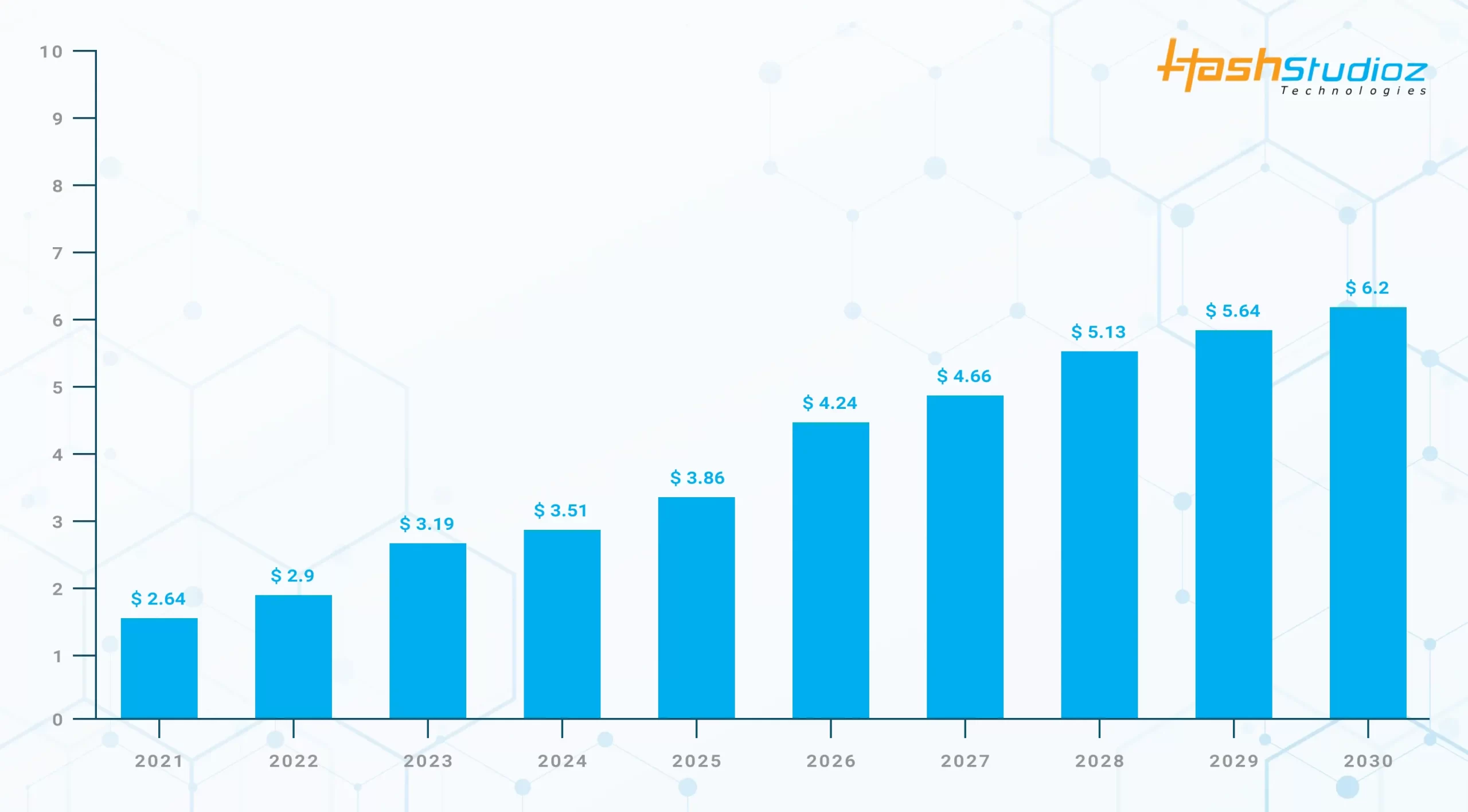Adopting robotic process automation (RPA) in healthcare enhances process efficiency and reimagines patient care. Adapting to change poses challenges. Before implementing RPA, understanding its benefits and potential use cases is essential. RPA streamlines workflows reduces errors, and allows you to focus on critical tasks, leading to better patient outcomes. Cost savings, accuracy, compliance, and faster data processing are additional advantages.
Market Statistics for RPA in Healthcare
- 33% of healthcare provider tasks can be automated – McKinsey
- In the next three years, 50% of US healthcare providers will invest in RPA – Gartner
- A 26% growth is projected in the healthcare market by 2030 based on RPA – Precedence Research

Table of Contents
Benefits of RPA in Healthcare
RPA is an advanced technology that enhances accuracy and ensures compliance with regulations in healthcare. It has the potential to improve productivity and improve healthcare outcomes. Here are some benefits of RPA for healthcare:
- Enhance Healthcare Monitoring : By providing clinicians and healthcare professionals access to easy data and real-time insights, they can provide better diagnoses and treatment pre- or post-discharge. Additionally, these RPA bots can generate red flags in case of discrepancies or emergencies.
- Efficient Revenue Management : Healthcare systems are burdened by massive code changes in revenue cycles and billing criteria. RPA adapts seamlessly to these dynamic requirements to simplify billing and revenue management.
- Improved Data Interoperability: With AI technologies like Machine Learning, and OCR, healthcare providers can create an ecosystem of intelligent document processing to collect data from any system, in any format, and enable easy data access.
- Streamline Workflow Management: Right from patient scheduling to claims management, RPA in healthcare reduces errors and manual intervention by removing employees from repetitive tasks and allowing them to focus on adding value to patient care.

- Stronger Billing Cycle: With AI-built intelligent document processing, medical billers can extract, analyze, validate, and update patient bills autonomously for payment initiation and audit report management.
- Cost Management: RPA reduces operational costs by automating healthcare processes and eliminating the need for paper-intensive processes. Moreover, healthcare providers can use it to improve patient care management.
Top Applications of RPA in Healthcare
The following are some of the top RPA applications in healthcare that will help you understand why intelligent automation is important in the healthcare industry.
Tracking Assets
A nurse spends 6,000 hours a year searching for lost equipment, wasting valuable time. Additionally, failure to locate assets effectively can negatively affect the patient’s experience of care, increasing wait times and delaying vital treatment.
Combining RPA with digital sensors and cloud-based control panels allows staff to locate assets easily; verify that equipment inventories are accurate and current; and monitor the condition of assets to ensure they are replaced when necessary.
For example, In UK T-Systems is using RPA to develop various health solutions, including ensuring seamless organ transplant operations by tracking time and location.
Electronic Records and Data Sharing
There are a wide variety of sources of health data, including doctors, third-party portals, insurance companies, appointment scheduling systems, and databases of health records. It would require significant resources to streamline all health data sources into one. Through efficient patient record processing, RPA can reduce health resources dedicated to menial admin tasks.
Approximately $2.1 billion is spent by the healthcare industry on poor data management that is prone to errors. RPA is therefore a welcome solution to improve the efficiency and accuracy of healthcare data management.
In addition, RPA can be used to ensure electronic data sharing in healthcare adheres to privacy protocols, by regulating permissions and access rights. Furthermore, RPA prevents data loss and corruption by detecting and responding rapidly to cyber-attacks. Healthcare providers will benefit from RPA-enabled cyber security, especially those that have suffered security breaches in the past.
Data Analytics and Diagnostics
Healthcare providers collect significant amounts of data from patients every day, which is often left untouched. Analyzing this data with RPA can generate valuable insights and analytics tailored to the individual patient. With more accurate diagnosis and treatment, healthcare professionals can assist patients and improve the patient experience.
For example, a hospital in Dublin has invested in RPA to input and analyze patient disease codes and results. A hospital can save roughly three hours of work a day by implementing this process alone.
Furthermore, RPA can assist the diagnostic process and perform online screening processes in rapidly growing telehealth services.
Post-Treatment Care
Post-discharge care can also be managed with RPA, allowing patients to recover at home independently, after leaving a health facility. An RPA could alert patients to important actions, such as taking medication, eating a balanced diet, or adhering to a meal plan.
Furthermore, RPA could prompt patients to measure necessary data, such as blood pressure. RPAs could alert healthcare professionals if conditions were worrisome. Therefore, the RPA serves as a means of communication between the hospital and the home. Healthcare providers and patients can benefit from this, as it allows for at-home recovery and relieves pressure on hospital beds.
Appointment Scheduling
Appointment scheduling is a time-consuming task closely associated with electronic records which could be automated by RPA. RPA could increase efficiency by scanning incoming data and arranging appointments based on symptoms or suspected diagnoses, doctor availability, location, or most convenient time. Furthermore, this would improve patient satisfaction while relieving healthcare professionals of laborious scheduling tasks.
Billing, Payments, and Claims Management
It is also possible to streamline health care payments using RPA systems, combining costs such as tests, medicines, food, and doctor fees into one. Health professionals save time and prevent billing errors by processing bills into invoices quickly and accurately. Additionally, RPA can send personalized reminders to patients if payment delays occur.
Similarly, RPA can process time-consuming health claims. An RPA solution takes 12 seconds to check the status of a health insurance claim compared to 85 seconds for a human. This means that one robot could perform the work of nine full-time employees without errors. Approximately 25% of claims are denied due to administrative errors, including registration and eligibility issues. Considering that each claim costs approximately $118, an RPA solution can reduce this unnecessary financial loss. For example, a United States hospital has implemented RPA to verify payor eligibility and identify missing information. As a result, claims processing and payment are slowed down.
Use cases
Many healthcare service providers have successfully incorporated automation into their operations after realizing the potential of RPA. Let’s look at a few use cases utilizing RPA development services for healthcare:
- Automate Mundane Administrative Operations: RPA can handle tasks like appointment scheduling, patient registration, claims processing, billing, and inventory management, freeing up healthcare professionals for more critical duties
- Improve Revenue Cycle Management Procedures: RPA can expedite claims adjudication, payment posting, denial management, patient eligibility verification, and revenue reporting, leading to more efficient revenue collection in healthcare.
Healthcare Automation that Affect the Future of Healthcare

- AI-infused: Healthcare organizations utilize AI to create a personalized experience for patients.
- Rapidly Evolved Patient Requirements: As patients expect 24/7 assistance for health checks and diagnoses, AI and automation are taking over the medical field.
- Internet of Things (IoT): The Internet of Things harnesses human-machine interactions with trackers that monitor real-time operations in healthcare.
- Intelligent Apps: Apps with machine learning and natural language processing can augment human activity to provide insights that will improve the quality of virtual care, home care and patient care.
- Smart Data Management: With RPA, healthcare providers, suppliers, and patients can easily share electronic health records.
- Bridging the Healthcare Technology Gap: To bridge the gap between technology and healthcare, RPA in healthcare and AI have proven to be the sure-shot solution.
How HashStudioz can Help?
Since the healthcare industry faces resource scarcity and data management issues. Automating healthcare services with HashStudioz, an app development company, is crucial for efficiency and cost savings. Our skilled AI/ML experts offer top-notch healthcare RPA software development for startups and enterprises, serving diverse organizations. Invest now to seize opportunities.
Conclusion
RPA has emerged as a transformative force in the healthcare industry, streamlining processes, improving patient care, and driving operational efficiency. From automating repetitive tasks to enhancing data accuracy and compliance, its applications and benefits are boundless. Embracing RPA is not just a choice; it’s a crucial step towards a more agile, cost-effective, and patient-centric healthcare landscape. Welcome to the future of healthcare automation!

Frequently Asked Questions
How RPA is being used in healthcare today?
- Automates repetitive tasks like scheduling, data entry, and claims processing.
- Improves accuracy and efficiency in administrative tasks.
- Frees up staff time for patient care.
How can I get started with RPA in my healthcare organization?
- Identify repetitive, high-volume tasks.
- Choose an RPA vendor and develop bots.
- Integrate bots with existing healthcare systems.
What are the challenges of implementing RPA in healthcare?
- High initial investment and ongoing maintenance costs.
- Data security concerns require careful planning.
- Limited ability to handle complex decision-making.
Is RPA secure for use in healthcare?
- RPA can be secure with proper access controls and data encryption.
- Focus on robust security measures during implementation.

